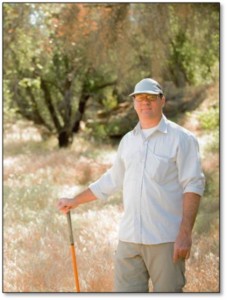CSUN Professor Brings Reptile Research Expertise to the Big Screen
California State University, Northridge herpetologist Robert Espinoza studies animals that make most people cringe. But being a herpetologist — a scientist who studies snakes, lizards, and amphibians — for most of his life has come with some neat perks.
“I’ve done a few Hollywood-y things in the past,” Espinoza said. “I was a set decorator’s consultant for a couple of movies.”
Espinoza’s consulting expertise in reptiles began in the early 2000s, when he met with the filmmakers of “Lemony Snicket’s A Series of Unfortunate Events,” which included a herpetologist as one of the main characters.
“They wanted the sets to be authentic. They wanted to have [herpetology] books on the shelves, not just random ones. The [set directors] had me build a list of literary sources for them. I got to go on set and check it out. They did a really incredible job.”
Since then, Espinoza has consulted for the Discovery Channel for a show on its network and National Geographic’s magazine, including recent articles on reptilian vocal communication and visual senses.
Having more science consultants in the entertainment industry shows that audiences are becoming more sophisticated, Espinoza said.
“The more things go online, people can watch things slowly and pay attention the way [curious people] do,” he said. “People tend to want things to be as realistic as they can be.”
Espinoza pointed to the accuracy of the television show, “Big Bang Theory,” which has actress and neuroscientist, Mayim Bialik, playing a neuroscientist.
“That show gets the science parts down pretty accurately,” he said. “The nerds of the world are rejoicing, because you can educate people while entertaining them.”
Away from the big and little screens, Espinoza is dedicated to educating through hands-on experiences. The general fearful or disgusted reaction to reptiles can close people off to being receptive to education about them, he said.
“Since our ancestors evolved on the African Savannah, where there are a bunch of deadly animals including reptiles, we come with an instinct to be wary of snakes,” he explained. “The fear that is often associated with reptiles can be slowly chipped away —especially with children. If you can break through that barrier, then education can happen.”


 experience
experience